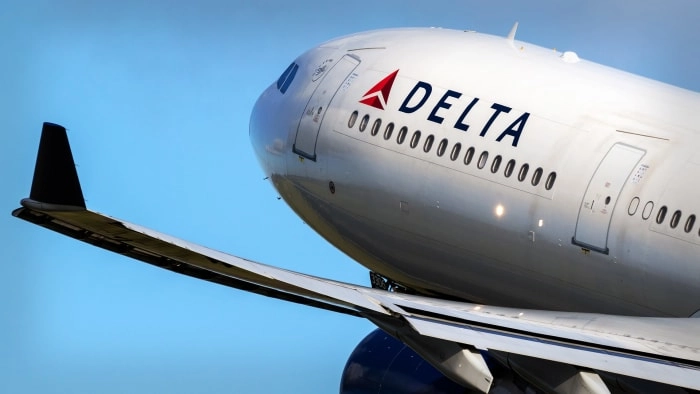The airline industry nearly crashed when Covid struck. Before the pandemic, around 4.5 billion flyers flew globally; this was downsized to 1.8 billion in 2020, only to recover to 91% of pre-pandemic levels in 2023.
Many carriers didnt survive this and went bankrupt. Apparently, the biggest, toughest, and sneakiest airlines managed to survive and continue to stay afloat despite new challenges, such as inflation, higher labor costs, and tariffs.
=�=� Don't miss the move: Subscribe to TheStreet's free daily newsletter =�=�
What sets Delta Air Lines ( DAL ) apart from the rest of the carriers is being more focused, more aggressive, and just overall better managed, according to Forbes.
These services, however, come with a hefty price. According to Simple Flying, Delta is more expensive than United and American, charging $0.1550 per mile on average, versus $0.1548 and $0.1514 per mile, respectively.
FlyOfinder offers strategies to save money on Delta flights.
Delta Air Lines money-savers include:
- Traveling on Tuesdays, Wednesdays, and Saturdays (avoiding Fridays and Sundays);
- Booking flights scheduled for later in the evening;
- Using a special smart tool called the Delta Low Fare Calendar, which helps you find the best airline deal available across various dates.
Other options to fly cheap with Delta include booking in advance (one to three months ahead for domestic flights) and signing up for fare alerts.
However, Delta's plans to expand its pricing policy threaten all these ways to find affordable deals.

Lawmakers raise concerns about Delta Air Lines' expanded pricing policy, specifically regarding privacy issues and potential price discrimination.
Image source: Shutterstock
Delta to use AI to price 20% of domestic flights, raising concerns from lawmakers
During its second-quarter earnings call, Delta Air Lines President Glen Hauenstein shared more details about the companys new pricing initiative, reported The Streets Christy Rakoczy.
Delta will be working with Fetcherr to analyze consumer data and set ticket prices based on the amount the AI tool thinks consumers are willing to pay.
Currently, the airline is pricing up to 3% of domestic flights with this AI tool, but it plans to expand it to 20%.
What does Deltas AI pricing tool mean for flyers?
While Delta Air Lines has not publicly disclosed how its AI pricing tool works, both consumers and lawmakers are raising concerns that it is based on the misuse of personal data to gouge prices.
On July 21, three U.S. senators Ruben Gallego (D-Ariz.), Richard Blumenthal (D-Conn.), and Mark R. Warner (D-Va.) sent a joint letter expressing concern about the privacy issues and potential price discrimination.
Deltas current and planned individualized pricing practices not only present data privacy concerns, but will also likely mean fare price increases up to each individual consumers personal 'pain point' at a time when American families are already struggling with rising costs, the senators' letter to Delta Air Lines reads.
The senators have demanded that Delta answer a series of questions about its plan by August 4, 2025.
So far, Delta responded, There is no fare product Delta has ever used, is testing or plans to use that targets customers with individualized offers based on personal information or otherwise, according to Reuters.
Delta added that AI technology for dynamic pricing (based on factors such as customer demand and no consumers personal data) is being tested to eliminate manual processes and accelerate analysis.
Some consumers said on Reddit that even though Delta says it will not price the tickets individually, they dont believe them.
Delta has been spending at least two years now actively making their entire brand about screwing the customer into the ground and squeezing every last dime out of them. Why should we believe a word they say, one customer wrote.
More Airlines:
Whats more, lawmakers are stepping up their efforts to prevent price inflation based on the misuse of personal data.
First federal proposal aims to ban AI use for setting prices and wages based on personal data
According to a Federal Trade Commissions new study, Retailers frequently use peoples personal information to set targeted, tailored prices for goods and services from a person's location and demographics, down to their mouse movements on a webpage.
To address this growing issue, Congressman Greg Casar (D-Texas) and Congresswoman Rashida Tlaib (D-Mich.) have introduced the Stop AI Price Gouging and Wage Fixing Act.
This bill aims to prohibit practices like an airline raising prices for an individual after finding their search for a family obituary, for example. The assumption is that if someone is looking for an obituary, the algorithm might conclude that the person must travel urgently for a funeral.
With less flexibility on the date and time of the flight, potential flyers are willing to pay more. This practice would suggest exploiting emotional vulnerability.
The American Economic Liberties Project is one of many supporters of the bill. The nonprofits senior legal counsel, Lee Hepner, said:
Armed with extraordinary access to personal information, corporations are using opaque algorithms to set prices based on perceived individual need, which often means higher costs for essential goods. Grocery prices have risen 26% since the pandemic-era explosion of online shopping, dovetailing with new technology designed to squeeze every last penny from consumers.
Hepner called on other federal lawmakers to join this fight for fair pricing.
The Stop AI Price Gouging and Wage Fixing Act of 2025 would:
- Prohibit surveillance-based price setting (which sets different prices for consumers based on personal data such as browsing history, location, race, gender, address, or genetics).
- Prohibit the use of surveillance-based wage setting.
- Allow the ban to be enforced by the Federal Trade Commission, state attorneys general, a private right of action, and in the case of wages, the Equal Employment Opportunity Commission.
The bill does not ban discounts for members of loyalty programs or groups like veterans or seniors.



